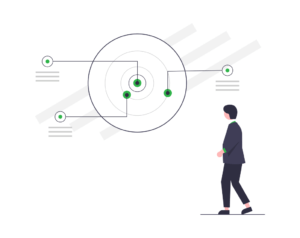In the ever-evolving digital landscape, the rules of engagement are perpetually shifting. Traditional single-channel marketing strategies are rapidly becoming obsolete, replaced by a customer-centric and more comprehensive approach – omnichannel digital marketing. To stay competitive, businesses need to understand and embrace this strategic shift.
Writing this article, we’ll explore the concept of omnichannel digital marketing, its benefits, strategies, and how you can implement it to enhance your marketing efforts.
What is Omnichannel Digital Marketing?
Omnichannel digital marketing is a modern marketing strategy that focuses on delivering a consistent, personalized experience to customers across all touchpoints.
Unlike multichannel marketing, which merely ensures presence across multiple platforms, omnichannel marketing emphasizes seamless and integrated experiences irrespective of the chosen platform – be it mobile apps, social media, websites, or physical stores.
In essence, omnichannel marketing is about understanding your customer’s journey and ensuring they can transition effortlessly between channels while keeping the communication relevant and consistent.
Why Omnichannel Digital Marketing?
In an era where customer preferences and digital technologies are rapidly evolving, companies should choose omnichannel digital marketing to create a seamless, personalized customer experience across multiple touchpoints. It enables businesses to maintain consistency in their brand’s message, voice, and image while also collecting valuable data from multiple channels for better understanding customer behavior and preferences.
This approach leads to improved customer engagement, increased conversion rates, customer loyalty, and ultimately higher sales, ensuring that businesses stay competitive in the digital marketplace.

To summarize, omnichannel digital marketing can offer an organization:
- Customer Centricity: Omnichannel marketing places the customer at the core of its strategy. It allows businesses to interact with customers in a personalized manner, enhancing the customer experience and fostering long-term loyalty.
- Increased Sales: Harvard Business Review observed shopping behaviors of 46,000 consumers and found that approximately 73% of consumers prefer shopping through multiple channels.
- Enhanced Data Collection and Analysis: This approach facilitates the collection of data from multiple sources, providing a holistic view of consumer behavior. Marketers can use this data to fine-tune their strategies and ensure their marketing efforts are more targeted and effective.
Implementing an Omnichannel Digital Marketing Strategy
- Customer Journey Mapping: Start by mapping your customer journey across all touchpoints. Understand how your customers interact with your brand on different platforms. This will help you identify gaps in the experience that need to be addressed.
- Data Integration: Make sure that your data systems are integrated. For a seamless omnichannel experience, the data collected from each channel must be consolidated to form a unified customer view. This is vital to understanding your customer’s behavior and preferences.
- Channel Consistency: Your brand should maintain a consistent image, voice, and message across all channels. This will make your brand more recognizable and reliable in the eyes of your customers.
- Personalization: Utilize customer data to deliver personalized content, offers, and interactions. Personalization can drastically improve customer engagement, conversion rates, and customer loyalty.
- Responsive Design: Ensure that your digital platforms offer a responsive design that can adapt to different screen sizes. This is critical in today’s era, where customers switch between devices like smartphones, tablets, and laptops.
- Innovative Technology: Leverage technology such as AI and machine learning to analyze data, forecast trends, and automate interactions. You can use keyword mapping tools to better understand search intent, for example. These technologies can help deliver a truly personalized and streamlined customer experience.
- Continual Testing and Optimization: It’s crucial to regularly test your strategies and optimize them based on performance. Use analytics tools to monitor key metrics and gain insights into what’s working and what isn’t.
Tomorrow’s Marketing Strategy Is Omnichannel
The future of digital marketing is omnichannel. Businesses that don’t adapt will find themselves left behind in a world where customers demand more personal, more relevant, and more seamless interactions. Start implementing an omnichannel digital marketing strategy today and elevate your business to new heights.
Implementing omnichannel marketing might seem daunting initially, but the benefits it brings are immense. Not only does it create an enhanced customer experience, but it also provides businesses with a wealth of data to continuously optimize their strategies.
Schedule a Consultation
At SEO Succor, we take great pride in our omnichannel approach. Our roots may be in SEO, but we have the staff and the experience to integrate all of your channels.
Contact us today to learn more about how we can assist.
Schedule a complementary consultation with one of our omnichannel experts.


